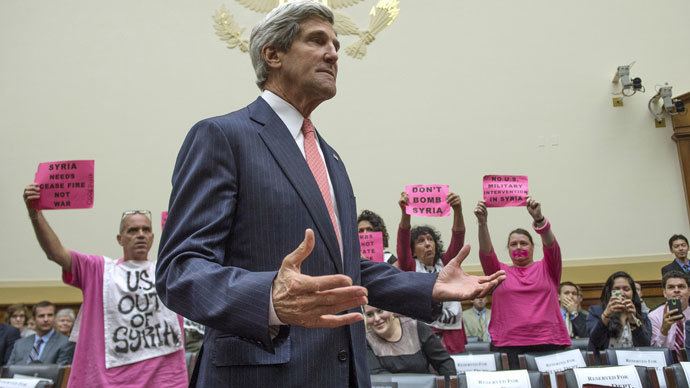Syrian impasse: A tragedy of errors

In the course of its walk to Congress, the US Administration has to devise a strategy for using force against Syria.
That appears to be leading inevitably to a regime change; quite an orthodox option that failed utterly in other countries of the Middle East but still reflects the traditional value-for-money calculation of the US strategic mentality.
How else can one understand plans to degrade capabilities of the Syrian military and upgrade those of the opposition? The goal of finding a political solution to the crisis is still present, but military intervention outside international law can only render the situation more intractable.
Russia has always dealt with other countries on the basis of non-interference in domestic affairs. Though reluctantly, we received Oliver Cromwell's ambassadors. We helped ensure that nobody interfered in American affairs, whether it was during the War for Independence or the Civil War, either by way of a policy of "armed neutrality" or naval demonstrations. That is why Russia can rightfully claim clarity and consistency in its foreign policy.
It is the bread of politics – domestic and foreign - to have to deal with the people we don't like. It is now widely admitted that the Western policy on Syria was based on a fundamentally flawed assumption from the very start of this crisis. The Syrian Government was expected to fall quickly or desert its base. It wasn't an innocent error of judgment since it resulted in Western partners' reluctance to encourage the opposition to negotiate with the government on political settlement. The opposition seems to have been counting on a Western military invasion. That is why there is such a lack of movement on launching a political process.

The idea of a traditional contact group on Syria is being put forward in Britain. It is a good suggestion. But such a group was assembled a year ago; the communiqué was agreed on June 30, 2012. The problem is that it is incomplete, with Iran and Saudi Arabia left out. We must have all the regional players on board since the Syrian crisis requires a regional solution. Another problem is that when Russia and the US agreed on May 7, 2013 to revive this initiative, both countries aimed to bring both sides of the Syrian conflict to the negotiating table. Russia delivered on it when the Syrian government accepted an invitation to attend the Geneva-2 peace conference. But the opposition preferred to continue waiting for a military option.
It would be next to impossible to try to begin a political process after military strikes have taken place. The tactics of waiting for an invasion have opened the door for an influx of all sorts of foreign terrorists and extremists who have their own ideological agendas which have nothing to do with the national interest of Syria. As a result, the situation has degraded to the point where there is no secular or moderate alternative to the present Syrian government, as Western observers admit.
And all of this is blamed on Russia. Tom Graham is absolutely right in questioning this dishonest shifting of responsibility. After the end of the Cold War, the US and the West became in charge of a truly global empire. But intellectual complacency and shortsightedness led to a tragic waste of time, political capital, and financial resources. If the US truly wanted to exercise its influence, the Middle East could become a more modern place and some conflicts, including the Arab-Israel conflict, could be resolved.
I truly believe that a political solution to the Syrian conflict is possible, since a strike against the country has not been launched yet.
The statements, views and opinions expressed in this column are solely those of the author and do not necessarily represent those of RT.
The statements, views and opinions expressed in this column are solely those of the author and do not necessarily represent those of RT.













